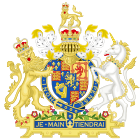Act of Settlement

|
|
| Long title | An Act for the further Limitation of the Crown and better securing the Rights and Liberties of the Subject |
|---|---|
| Citation | 12 and 13 Will 3 c. 2 |
| Territorial extent |
|
| Dates | |
| Royal assent | 1701 |
| Commencement | 1701 |
| Other legislation | |
| Amended by |
Various
|
| Relates to | Bill of Rights 1689 |
|
Status: Amended
|
|
| Revised text of statute as amended | |
The Act of Settlement is an Act of the Parliament of England that was passed in 1701 to settle the succession to the English and Irish crowns on Protestants only. The next Protestant in line to the throne was the Electress Sophia of Hanover, a granddaughter of James VI of Scotland and I of England. After her the crowns would descend only to her non-Roman Catholic heirs.
The act was prompted by the failure of King William III and Queen Mary II, as well as of Mary's sister Queen Anne, to produce any surviving children, and the Roman Catholic religion of all other members of the House of Stuart. The line of Sophia of Hanover was the most junior among the Stuarts, but consisted of convinced Protestants. Sophia died on 8 June 1714, before the death of Queen Anne on 1 August 1714. On Queen Anne's death, Sophia's son duly became King George I and started the Hanoverian dynasty in Britain.
The act played a key role in the formation of the Kingdom of Great Britain. England and Scotland had shared a monarch since 1603, but had remained separately governed countries. The Scottish parliament was more reluctant than the English to abandon the House of Stuart, members of which had been Scottish monarchs long before they became English ones. English pressure on Scotland to accept the Act of Settlement was one factor leading to the parliamentary union of the two countries in 1707.
...
Wikipedia
